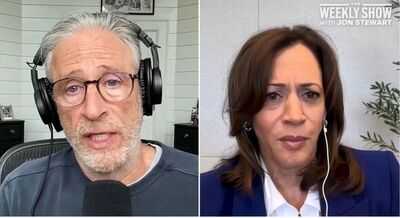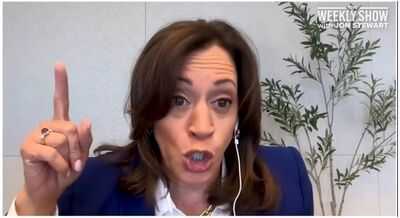
Former Vice President Kamala Harris appeared on Jon Stewart's podcast on Thursday, where she criticized President Donald Trump in a profane rant against his privately-funded $300 million ballroom that began construction during the ongoing government shutdown.
"Are you f-ing kidding me?" Harris exclaimed. "This guy wants to create a ballroom for his rich friends while completely turning a blind eye to the fact that babies are going to starve when the SNAP benefits end in just hours from now. Come on."
The Trump administration said it would not tap the $5 billion in contingency funds to keep SNAP benefits running into November, leaving 42 million low-income Americans without food benefits during the Thanksgiving month. Meanwhile, donors who stand to gain from appealing to the president have funneled hundreds of millions of dollars into creating the ballroom that Trump, his allies and guests can enjoy.
Melania spokesperson speaks out after president destroys first lady's offices
-
Karoline Leavitt says 'trust the process' as outrage grows over East Wing demolition
"I'm not going to be distracted by, 'Oh, does the guy have a big f---ing hammer?' What about those babies?" she asked during her appearance on Stewart's "The Weekly Show." The president and his allies have blamed the shutdown on Senate Democrats, who have refused to vote to reopen the government until Republicans negotiate on extending health subsidies before they expire for millions of Americans.
When asked if Democrats could employ a similar type of bulldozer-style approach to governance, Harris highlighted the distinction between breaking political norms and attacking outright the bedrock of governmental standards. "It's important we not conflate disruption with destruction," she said.

Trump claimed last week that a wealthy "patriot" contributed $130 million of their own money to the government to cover lapses in military salaries caused by the ongoing government shutdown.
Speaking to reporters in the White House, Trump called the donor a "friend of mine," but declined to name them. "He called us the other day and said, 'I'd like to contribute any shortfall you have because of the Democrat shutdown... because I love the military and I love the country,'" Trump said.
The mysterious donation to the federal government comes after Trump had responded coyly to questions about who funded his $300 million ballroom in place of the White House's East Wing, which he previously claimed he would pay for himself.
According to the administration on Thursday, ballroom donors include giants in the tech and crypto industries, sitting Trump-appointed federal government officials and other wealthy business owners and entrepreneurs close to the president.
Trump has not disclosed the amount each donor is contributing to his ballroom project, nor if the "patriot" donor who offered to fund active-duty service members' paychecks during the shutdown also donated to the ballroom.
Tech companies including Amazon, Apple, Google, Microsoft, Palantir, HP and Meta Platforms reportedly donated to the ballroom alongside Coinbase, Ripple, Tether and the Winklevoss Twins. They were joined by tobacco companies Altria Group and Reynolds American, Blackstone CEO Stephen Schwarzman, oil magnate Harold Hamm, Israeli-American investor Isaac Perlmutter, private equity investor Konstantin Sokolov and Manchester United soccer team owner Edward Glazer, according to Politico.
- Stephen Colbert launches into rant against Trump as he makes Epstein comment
- Stephen Colbert issues brutal blow to Donald Trump over White House ballroom 'lie'
- Trump fumes at Nobel Peace Prize snub saying has 'saved hundreds of millions of lives'
Also on the list are the Trump-appointed Commerce Secretary Howard Lutnick, Small Business Administrator Kelly Loeffler and Benjamin Leon Jr., who Trump nominated to be the ambassador to Spain.
Several of the donors stand to benefit from courting favor with the president. The murky financial arrangements come after Trump accepted an "unconditional gift" from Qatar in the form of a jet, which he is converting for use as Air Force One.
It is unclear when the shutdown, which began on Oct. 1, will come to an end. Democrats have held firm in their demands to extend critical health insurance subsidies and to end Trump's attempts to cancel congressionally approved spending before they approve a budget.
The battle over health insurance subsidies comes after Trump's domestic spending bill cut federal spending on Medicaid and Children's Health Insurance Program benefits by $1.02 trillion, according to the nonpartisan Congressional Budget Office. At least 10.5 million people are expected to be eliminated from the programs by 2034.
Federal food assistance programs such as SNAP have existed in the U.S. since the 1930s. President Lyndon B. Johnson signed the Food Stamp Act of 1964, effectively creating the modern food assistance programs seen today. The program was renamed to SNAP, and the original food coupon booklets were replaced with electronic debit cards that recipients can now use to pay for food.
In August, the Secretaries of Agriculture and Health and Human Services announced the signing of waivers that banned low-income beneficiaries in six more states from using government-issued benefits on soda and other unhealthy foods. The waivers were signed for Florida, West Virginia, Oklahoma, Texas, Louisiana and Colorado, joining already-restricted states Iowa and Indiana.
Though the Trump administration claimed the move was intended to steer Americans toward healthier food choices, critics said the ban amounts to a federal penalty on poverty.
The government shutdown, which began Oct. 1, is now the second-longest on record. While the Republican administration took steps leading up to the shutdown to ensure SNAP benefits were paid this month, the cutoff would expand the impact of the impasse to a wider swath of Americans - and some of those most in need - unless a political resolution is found in just a few days, according to The Associated Press.
The prospect of families not receiving food aid has deeply concerned states run by both parties.
Some states have pledged to continue SNAP benefits even if the federal program halts payments, but there are questions about whether U.S. government directives may permit this. The USDA memo also states that states would not be reimbursed for temporarily covering the cost.
You may also like

Add a dash of flavour to your dinner party, try these unique mushroom recipe ideas.

Allu Arjun welcomes sister-in-law Nayanika to the family after engagement with brother Allu Sirish

Stop pouring excess cooking oil down your drain as foil trick is much safer

Rare mobile SIM deal hands out 80GB for £10 a month in double-data offer

Sequel to huge action film fans say is 'one of the greats' on ITV today






